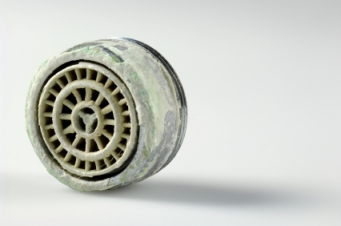Get Rid of Hard Water Stains

Stains from hard water deposits not only look bad, but can also mar your surfaces permanently unless you take care of them promptly. These stains may be located in bathtubs, toilets, sinks, coffee machines, cookware, and anything else that comes in regular contact with water.
Understanding Hard Water
Hard water refers to a water source with a high concentration of minerals, especially calcium, magnesium and iron. Most city and municipal water suppliers have filtering and purification processes that remove some of the minerals from their local water supply. People who use well water tend to have the most serious hard water issues.
Hard water deposits minerals on materials such as:
- glass
- porcelain
- enamel
- fiberglass
- stainless steel
- tile
This produces a cloudy layer of film, called lime scale, which is the result of calcium and magnesium. If you've ever tried to clean a shower door -- or even a drinking glass – that has hard water "spots," you know that the film does not come off easily. These minerals bond to the surface and if they are not removed, they will actually become permanently etched. As well as causing this white film, lime deposits make soap stains worse because they prevent the soap from breaking down correctly.
Other unsightly hard water deposits include brownish toilet rings, and brown, black, blue or green stains near the water source or water line in the tub or sink. These are caused by iron, brass and copper in the water. If left alone for too long, these deposits also can become impossible to remove.
How to Get Rid of Hard Water Deposits
- Solutions from your Pantry
You might have what you need to clean hard water deposits right in your pantry. Remove lime scale with white vinegar or a lemon (just cut the fruit in half and rub it on the stain). However, if the stain is covered by layers of soap scum, it may require a lot of elbow grease or a stronger cleanser.
The North Carolina Cooperative Extension Office offers a few more suggestions:
- Make a paste of white vinegar and baking soda, let it sit and then rinse.
- Mix 2-4 tablespoons of trisodium phosphate (okay, you might have to buy this one) in a gallon of water, scrub and rinse well.
The second recipe is also good for rust stains. Vinegar is commonly used to get stains out of coffee machines and can even be put into the rinse cycle compartment of a dishwasher to help eliminate and prevent spots on dishes. Don't use acids on marble or granite, though, because they can etch the surface of natural stone.
- Commercial Products
If homemade recipes are not tough enough to remove the hard water deposits in your home, a trip to the local hardware store might help. Products such as CLR; Lime Away; and Zep Calcium, Lime and Rust Remover are formulated to remove tough mineral stains. Always follow manufacturer directions when using these products. Be sure to open a window and/or turn on a fan to ventilate the area well; wear gloves. Also, always be sure the product is compatible with the surface you plan to use it on.
A visit to an online forum about the topic revealed many products which people claimed had removed their hard water deposits. Some of the most common suggestions (other than lemon and vinegar) include: CLR, The Simple Cleaning Solution, and Orange Hand Cleaner with pumice and Bounce dryer sheets.
Call for Professional Cleaning Help
If all else fails, call professionals, like a maid service. They may be able to remove a tough stain with something in their cleaning arsenal that includes phosphoric or sulfuric acid. They will also be able to tell you if it's too late to remove the stain. Remember, the longer you leave hard water deposits, the less likely it will be able to be removed.
Prevention
Installation of a water softening system by a qualified plumber can prevent most future problems. If that isn't an option, keep stain-prone areas as dry as possible. Stash a squeegee and a spray bottle with lemon juice conveniently right in the shower stall. Squeegee after every shower. Spray the shower walls and head with lemon juice and wash with a damp sponge once a week. Wipe basins and faucets dry after use.
Once you scrub off those nasty hard water deposits, it's best to do touchup cleaning often. Otherwise, you will have to exert a lot of energy -- or resort to harsh chemicals -- to get them clean again!
Looking for a Pro? Call us (866) 441-6648



